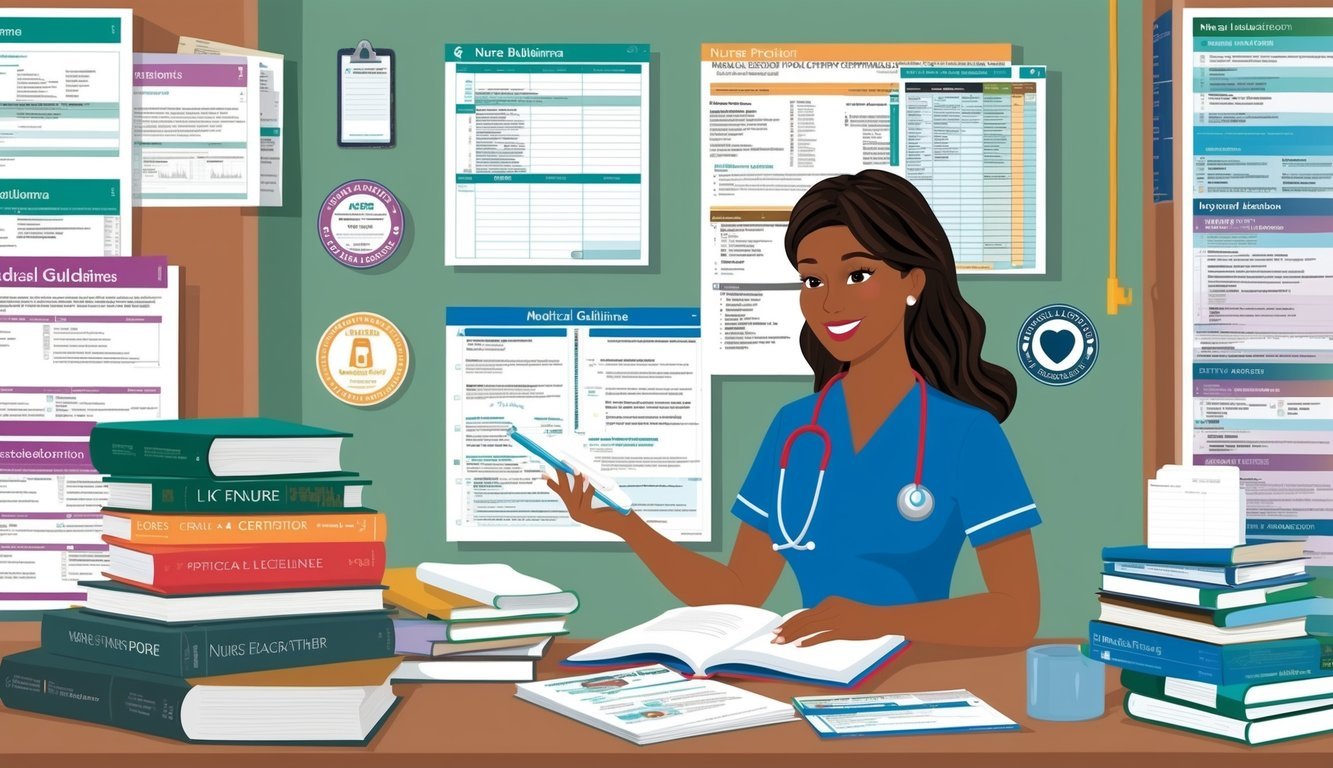Becoming an acute care nurse practitioner (ACNP) is an exciting opportunity for those passionate about healthcare.
To embark on this career path, you need a solid educational background.
Typically, this starts with a Bachelor of Science in Nursing (BSN), followed by a master’s or doctoral degree in nursing.
This profession allows you to provide critical care to patients with complex health issues, often in hospitals or intensive care settings.
The journey to becoming an ACNP involves not only academic qualifications but also obtaining the necessary certifications and licenses.
You will engage in hands-on clinical experience, which is vital for honing your skills.
This role can lead to advanced career opportunities, including specialization in specific patient populations or advanced procedures.
As you consider this rewarding profession, it’s essential to understand the various steps involved.
Gaining insights into the educational pathways, certification requirements, and professional experience needed can empower you to make informed decisions about your career.
Key Takeaways
- A BSN is the first step toward becoming an acute care nurse practitioner.
- Certification and practical experience are crucial for success in this role.
- Opportunities for specialization can lead to advanced career paths in nursing.
Understanding the Role of an Acute Care Nurse Practitioner
An Acute Care Nurse Practitioner (ACNP) plays a vital role in managing patients with serious health issues.
You will be responsible for assessing, diagnosing, and treating acute illnesses.
This section highlights critical areas of focus for ACNPs, including handling critical care situations and understanding the scope of practice.
Critical Care and Acute Conditions
As an ACNP, you will work primarily in settings like hospitals and urgent care facilities.
Here, you will encounter patients with acute conditions requiring immediate attention.
Key responsibilities include:
- Performing physical assessments to identify acute health issues.
- Ordering and interpreting diagnostic tests, such as X-rays and lab work.
- Creating and implementing treatment plans tailored to each patient’s needs.
With a focus on critical thinking, you must quickly evaluate changes in a patient’s condition.
This skill is crucial in emergency situations where timely interventions can significantly impact outcomes.
ACNPs also collaborate with other healthcare professionals to ensure comprehensive patient management.
Scope of Practice and Patient Care
Your scope of practice as an ACNP includes a broad range of skills and responsibilities.
You have the authority to prescribe medications and manage ongoing patient care.
Important aspects of your role include:
- Managing complex health issues that require advanced clinical judgment.
- Educating patients and families about health conditions and treatment options.
- Monitoring patient progress and adjusting care plans as needed.
You will use your skills in critical thinking to assess patient responses and adapt treatments accordingly.
Understanding health issues like heart failure, respiratory distress, and trauma care will be vital in providing high-quality care to your patients.
For further insights on the considerations and responsibilities involved, you can explore resources from Nurse.org and NurseJournal.
Educational Pathways
To become an Acute Care Nurse Practitioner (ACNP), you must follow specific educational pathways.
These pathways include obtaining an undergraduate nursing degree and pursuing advanced graduate education in nursing.
Each step builds on your knowledge and skills, preparing you for the complexities of acute care.
Undergraduate Nursing Degrees
The first step to becoming an ACNP is earning a nursing degree.
Most aspiring practitioners start with a Bachelor of Science in Nursing (BSN).
This degree typically takes four years and provides a comprehensive foundation in nursing.
If you have an Associate Degree in Nursing (ADN), consider enrolling in an RN-BSN program, which can often be completed in about two years.
Your undergraduate education covers essential topics such as anatomy, pharmacology, and patient care techniques.
Clinical experiences in various healthcare settings will also help you gain hands-on skills.
After obtaining your BSN, you will be eligible to sit for the NCLEX-RN exam to become a licensed registered nurse (RN).
Graduate Education and Specialization
After earning your BSN, the next step is to pursue graduate education.
You can opt for a Master of Science in Nursing (MSN) or a Doctor of Nursing Practice (DNP) program, depending on your career goals.
An MSN program typically takes about two years and often includes a specialization in adult-gerontology acute care.
Meanwhile, DNP programs focus on clinical practice leadership and require a deeper commitment, usually taking three to four years.
Both pathways will require you to complete a minimum of 500 direct patient care clinical hours.
Completing either program prepares you to obtain certification as an Adult-Gerontology Acute Care Nurse Practitioner.
These educational routes position you to excel in critical healthcare roles, offering essential care to patients in urgent situations.
For more information on specific programs, check resources like Nurse.org.
Certification and Licensure

Certification and licensure are crucial steps in becoming an Acute Care Nurse Practitioner (ACNP).
You need to prepare for the certification exam and ensure that you obtain your Advanced Practice Registered Nurse (APRN) license to practice legally.
Preparing for the Certification Exam
Before you can work as an ACNP, you must pass a certification exam.
The American Nurses Credentialing Center (ANCC) and the American Association of Critical-Care Nurses (AACN) both offer board certification.
To prepare:
- Choose a Certification: Decide between AGACNP-BC (Adult Gerontology Acute Care Nurse Practitioner) or ACNPC-AG.
- Study Resources:
- Use review books and online courses.
- Join study groups or forums.
- Application Process: Submit your transcripts and proof of clinical hours to your preferred certifying body.
Be mindful of the exam passing rates and recommended study periods to ensure you are well-prepared.
Obtaining Your APRN License
Once you pass the certification exam, the next step is to secure your APRN license.
Each state has specific requirements, so it’s essential to check your local nursing board.
Key steps include:
- Apply for Licensure: Submit your application along with certification proof.
- Background Check: Most states require a criminal background check.
- Continuing Education: Stay updated on continuing education requirements to maintain your license.
Use resources from your state nursing board to ensure compliance.
Understanding these steps can help you successfully navigate the path to becoming an ACNP.
Gaining Professional Experience
To become an acute care nurse practitioner, gaining practical experience is essential.
This involves participating in clinical practicums and continuing your education to refine your skills.
Both avenues help you build the competence needed for advanced practice.
Clinical Practicums and Residencies
Starting with clinical practicums, these experiences are key for applying your knowledge in real-world settings.
Most programs offer structured practicums that allow you to work under the supervision of experienced practitioners.
Typically, you’ll complete a set number of clinical hours to fulfill your program requirements.
These hours provide exposure to various acute care environments, such as hospitals and urgent care.
After education, consider a residency program.
These typically last 12-24 months and immerse you in advanced practice.
They often focus on specialized areas in acute care and enhance your hands-on experience.
Continuing Education and Skills Development
Continuing education is crucial for your growth as an advanced practice registered nurse (APRN).
Many states require ongoing education for licensure renewal.
You can pursue certification courses in specialized fields, such as emergency care or critical care.
These courses not only help you stay updated on best practices but also improve your marketability.
Online platforms also offer workshops and seminars.
They focus on recent developments in acute care, helping you keep your skills sharp.
Building a network with other professionals through these programs can open doors for additional opportunities and mentorship.
Career Advancement and Specialization
As an Acute Care Nurse Practitioner, you have various paths for career advancement and opportunities for specialization.
These options can enhance your skills and expand your professional responsibilities within healthcare.
Advanced Practice Areas
In the field of acute care nursing, you can specialize in many areas.
Some key specialties include:
- Adult-Gerontology Acute Care Nurse Practitioner: Focused on adults, this role includes working in settings like intensive care units, where you manage complex medical conditions.
- Pediatric Acute Care: This area involves caring for children with acute health issues, often in critical care units.
- Specialty Clinics: You may work in clinics that focus on specific conditions, allowing you to develop expertise in managing particular patient populations.
Each specialty offers unique challenges and rewards.
Consider your interests and the specific needs in your community when choosing an area to specialize.
Leadership Opportunities in Healthcare
Your career can also lead to leadership roles.
As an Acute Care Nurse Practitioner, you might take on positions such as:
- Clinical Manager: Oversee nursing staff and ensure high-quality patient care.
- Nursing Educator: Teach the next generation of nurses, sharing your expertise in acute care settings.
- Policy Advocate: Get involved in healthcare policy-making to improve patient care standards.
These roles allow you to influence healthcare practices while advancing your career.
Pursuing additional education and certifications can provide the skills needed for these leadership opportunities.
Frequently Asked Questions

This section addresses common queries about becoming an acute care nurse practitioner.
You will find clear answers regarding educational requirements, salary expectations, certification steps, and job opportunities in this specialty.
What are the educational requirements for becoming an acute care nurse practitioner?
To become an acute care nurse practitioner, you typically need to earn a Bachelor of Science in Nursing (BSN) and then pursue a Master of Science in Nursing (MSN) or a Doctor of Nursing Practice (DNP) with a focus on acute care.
What is the average salary for an acute care nurse practitioner?
The average salary for an acute care nurse practitioner is around $120,000 per year.
Some may earn between $98,000 and $136,000, depending on experience, location, and the type of healthcare facility where they work.
What steps are necessary to obtain acute care nurse practitioner certification?
To obtain certification, you must pass the appropriate certification exam after completing your graduate program.
Achieving certification also requires that you meet specific clinical hour requirements and maintain your credentials through ongoing education.
How does the scope of practice differ for an acute care nurse practitioner compared to other nursing specialties?
Acute care nurse practitioners focus on treating patients with severe illnesses or injuries.
They often work in hospitals or urgent care settings.
This differs from primary care nurse practitioners, who typically manage chronic conditions and preventive care in outpatient settings.
What kind of clinical experience is required prior to enrolling in an ACNP program?
You generally need to have a significant amount of clinical experience as a registered nurse (RN) before enrolling in an ACNP program.
Many programs require at least 1-2 years of experience in an acute care or critical care setting.
How do employment opportunities for acute care nurse practitioners compare to other nurse practitioner specialties?
The demand for healthcare services is increasing, which is leading to growing employment opportunities for acute care nurse practitioners.
ACNP roles may offer unique job prospects in hospital settings, reflecting high demand in critical care areas.

